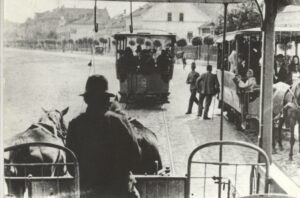The history of Public Transport in Bucharest – Ilfov Region

In 1871, just 12 years after Bucharest was designated the capital of the country, the Romanian Tramway Company was founded, and the first horse-drawn trams appeared on the streets of the city.
In 1894, the first electric tram line was launched, running from Obor to Cotroceni.
In 1909, public transport solidified its organizational and operational structures, expanding and modernizing in line with the times.
On June 12, 1909, the law was passed that physically and legally established the Bucharest Municipal Tramway Company, abbreviated as STB. The Bucharest Municipal Tramway Company began its economic rise. Its steady and reliable revenues allowed it to increase the number of depots and expand its fleet of vehicles, both horse-drawn and electric.
As electricity gained popularity, the horse-drawn tram became rarer on the tracks, with many stables left empty.
One day, on June 6, 1929, STB permanently withdrew the picturesque horse-drawn tram from all lines. In its place, the first bus routes appeared, with vehicles imported from the USA, Germany, and France.
By 1936, STB had a fleet of 392 vehicles operating on 22 routes across 131 kilometers of double track.
The 1950s saw the introduction of the first high-capacity tram, with 156 seats, two bogies, and three access doors, known as the Festival. During the same period, the first Romanian trolleybus was built. A year earlier, the first trolleybus line, from Piața Victoriei to Băneasa Hippodrome, was launched in Bucharest.
In the 1970s and early 1980s, ITB (Bucharest Transport Enterprise – the name that the former STB adopted in 1950) was the fourth-largest urban transport enterprise in the world, in terms of fleet size, service area, and the number of employees. The fleet exceeded 2,500 buses, 800 trams, 700 trolleybuses, hundreds of minivans, and over 1,000 taxis, with the enterprise employing more than 35,000 staff.
The 1989 Revolution led to the reorganization and modernization of public transport in the capital, setting it on new coordinates.
ITB transformed into the Autonomous Transport Authority of Bucharest (RATB). Given the urban conditions in Bucharest, the massive increase in traffic, the transportation needs of citizens, and the modernization of the road infrastructure implemented by municipal authorities, RATB developed a strategy based on projects aimed at several key directions.
A special focus was placed on modernizing the vehicle fleet. Another strategic goal for RATB was the rehabilitation of the tram tracks and the modernization of the infrastructure, particularly the electrical infrastructure for trams. The major benefits of this rehabilitation program include a 20% increase in transportation supply, a 10% increase in revenue on modernized routes, reduced operating costs, a 15% reduction in energy expenses, an increase in the lifespan of infrastructure by up to 20-30 years, improved traffic flow, reduced general chemical and noise pollution, and increased attractiveness of public transport. Additionally, traffic flow was optimized for maintenance and parking.
Another aspect of RATB’s modernization strategy was the implementation of a modern automated fare system that allows for the fare integration of several public transport operators in Bucharest.
In September 2018, the Bucharest Transport Company (STB SA) returned to its historical name. With the transformation of RATB into a commercial company, the groundwork was laid for the reform of the public passenger transport service across the Bucharest – Ilfov Region, restructured based on European principles.
The Bucharest – Ilfov Intercommunity Development Association for Public Transport (TPBI) was established, taking over the responsibility for providing public passenger transport services from Bucharest and the 40 local communities in Ilfov County, with the support of the two major administrative territorial units: the Municipality of Bucharest and the Ilfov County Council.
As a result, starting in 2019, other local transport operators emerged.
The Voluntari Transport Service – STV SA is the company of the Voluntari Local Council, which provides local public passenger transport under the Delegation of Management Contract for local public passenger transport services, concluded with the Bucharest – Ilfov Intercommunity Development Association for Public Transport. It connects the town of Voluntari (Ilfov County) with Bucharest through several regional routes.
This company has been operating since 2008, conducting passenger transport activities according to a schedule, after winning the right to use several routes through a public tender organized by the Ministry of Transport, via the Romanian Road Authority (ARR).
STV SA has periodically modernized its vehicle fleet, and currently has 100 urban buses with a maximum capacity of 80 passengers, all of which are used for public transport, meeting EURO 5 and EURO 6 pollution standards.
Currently, the fleet includes 100 buses, four MAN LION’S COACH buses – which are still used for educational and cultural activities for the Voluntari community, as well as a minibus. Additionally, 36 electric buses will be purchased through European funds.
Ecotrans STCM SRL, the third transport operator providing services in the region under the Management Delegation Contract signed with the Bucharest – Ilfov Intercommunity Development Association for Public Transport (TPBI), was founded by the Chitila Local Council in partnership with the Mogoșoaia Local Council, with fully state-owned shares. The main activity of the company is to provide local public passenger transport services for the residents of Chitila, Mogoșoaia, and Bucharest.
The purpose of establishing this company is to offer a modern and civilized alternative for public transport for the residents of this area. The routes provide connections between the city of Chitila and the municipality of Bucharest (round trip) and between Chitila and the commune of Mogoșoaia (round trip).
Regio Serv Transport SRL is the fourth operator that signed a contract with TPBI for the delegation of public passenger transport services. The company was founded in 2019 through the association of the Buftea Local Council (51%) and the Corbeanca Local Council (49%) to operate public transport services in the Bucharest-Ilfov region. Initially, Regio Serv Transport provided transportation links between Buftea and Chitila, with connections to Bucharest, and in the future, the company plans to expand its fleet to operate routes between Buftea and Corbeanca.



